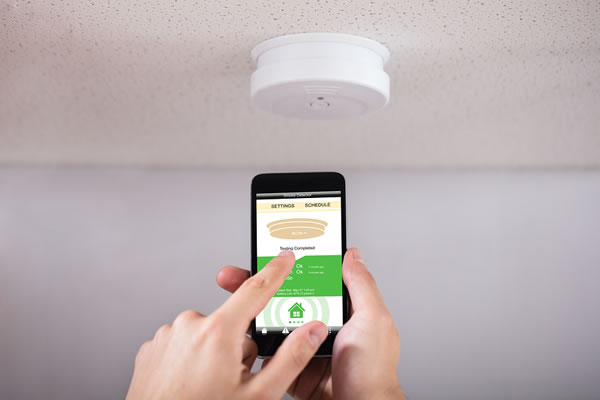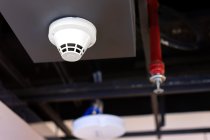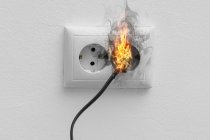Why Does My Smoke Detector Chirp?

August 19, 2025
Why Does My Smoke Detector Chirp?
Have you ever found yourself peacefully going about your day when suddenly your smoke detector emits its characteristic "chirp?" Ignoring this alarming sound can be challenging, interrupting peace on what may have been an otherwise enjoyable day. Why does this occur, and what can you do about it? Here, Neighborhood Electric discusses common causes as well as solutions and when to contact an affordable electrician.
Low Battery
One of the leading causes of smoke detector chirps is often low batteries. Even though your detector may be connected directly to the electrical system in your home, many models include an independent backup battery, which, when depleted, triggers it to start beeping to alert you that replacement needs to take place. Replacing batteries is usually an easy fix—simply make sure you have an appropriate type on hand and follow the manufacturer's instructions to replace them. Once done, all chirping should cease!
End of Life
Smoke detectors don't last forever. They most typically last 8-10 years before becoming inoperable. At that point, their lifespan begins to diminish, and they signal that it may be time for an upgrade by emitting an alert chirp to remind them it may be time for replacement. Check the manufacturer's date—anything over ten years may indicate it's time for an upgrade, as functioning smoke alarms are essential for personal safety!
Dust and Dirt
Another potential reason your smoke detector might chirp is dirt buildup. Smoke detectors are delicate devices, and any buildup of dust or dirt could impede their functionality and cause them to start beeping. If your detector begins chirping frequently, use a soft brush attachment on a vacuum cleaner with a soft bristle head to gently clean its sensors, being careful not to damage them in any way!
Temperature and Humidity
Extreme temperatures and humidity levels can also cause your smoke detector to emit alarm chirps. If it's placed in an environment that experiences sudden surges of hot or cold air or moisture-laden environments, its performance could suffer significantly. To get around this problem, try moving it somewhere more stable—moving may help end the chirping!
Electrical Issues
Sometimes, the source of the chirping noise might lie with electrical problems in your home's electrical system. If your smoke detector is hardwired into it, any wiring issues could trigger it to emit its alarm tone and chirp away at you all day long—something that requires professional expertise to resolve safely. When this is the case for your smoke alarm chirping away at you all day, calling an electrician would be wiser than trying to address the issue yourself, as DIY fixes could prove dangerous and time-consuming!
Faulty Detector
If, despite taking all these steps, your smoke detector still seems to be emitting alarm bells, it could be defective. Sometimes, smoke detectors develop issues that cannot be corrected—when this is the case, replacing them is the best choice. To find one suitable to your needs, consult an electrical repair service for recommendations of high-quality models to purchase.
How to Prevent Future Chirping
Regular maintenance and proper installation are the keys to keeping a smoke alarm functionally sound to stop future chirping. Here are a few suggestions for keeping it functioning optimally:
- Regular Testing: Make sure your smoke detector functions as intended by performing monthly checks to ensure everything works smoothly. Most models feature a test button you can press to test that will sound the alarm when needed.
- Battery Replacement: Batteries should be switched out every year, even if your detector hasn't started beeping yet. An ideal time is when setting your clocks back for daylight saving time.
- Proper Installation: If needed, hire an electrical repair service for assistance in installing your smoke detector. Correct installation will help ensure the detector operates as desired.
- Cleaning: Regularly clean your smoke detector to reduce dust and debris build-up and ensure its optimal functioning. This simple step can keep its operation smooth.
- Environment Control: To avoid false alarms and unnecessary chirping alarms from smoke detectors, try keeping their surroundings free of extreme temperatures and high humidity levels. Doing this may reduce false alarms as well.
When to Call a Professional
Sometimes, even your best efforts might still result in issues with your smoke detector. When this occurs, and chirping continues even with everything tried to remedy the situation, professional services should be called in; an electrician or electrical repair service has the tools and know-how necessary to diagnose and provide solutions that may evade you alone.
Remember, having an operational smoke alarm is critical to your personal and family safety. If ever in doubt, don't hesitate to seek professional assistance for smoke detector installation, replacement of defective units, or electrical problems; getting expert aid can give you peace of mind.
Neighborhood Electric
While a smoke detector chirp can be irritating, it also serves as a vital warning that something needs to be addressed immediately. Be it low battery levels, dust build-up, or electrical concerns, quickly responding to these needs will ensure your safety. Regular maintenance visits, proper device installation, and knowing when and who to call when something needs fixing will all play roles in keeping smoke alarms working optimally. So next time it begins chirping, you know exactly what steps must be taken and who to call— Neighborhood Electric!








